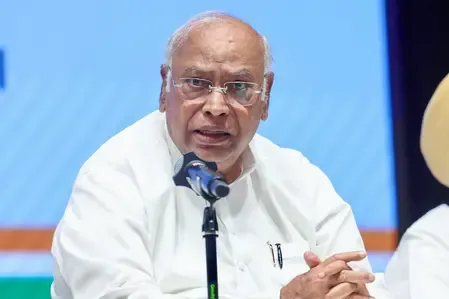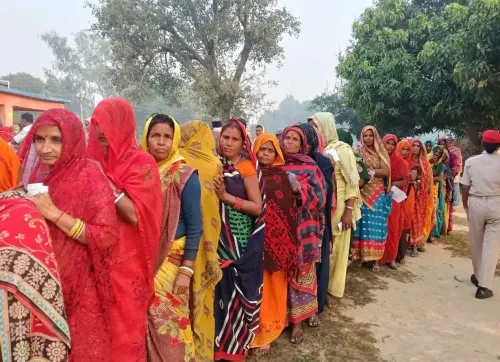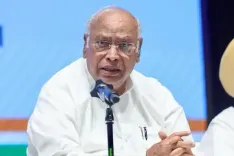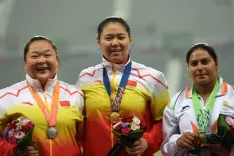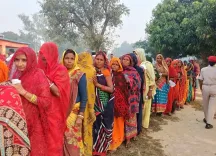Why Did Booker Prize Winner Banu Mushtaq Receive Such a Warm Welcome in Bengaluru?
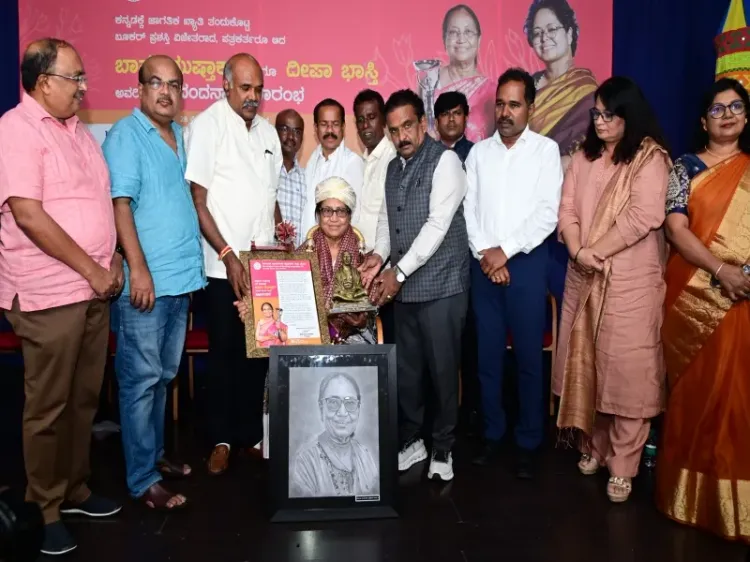
Synopsis
Key Takeaways
- Banu Mushtaq is a celebrated Kannada author and activist.
- She won the International Booker Prize for her anthology 'Heart Lamp'.
- Her book highlights the struggles of Muslim women in southern India.
- She actively participates in social movements advocating for human rights.
- Banu's writing promotes diversity and challenges fundamentalism.
Bengaluru, May 28 (NationPress) Banu Mushtaq, the acclaimed Booker Prize-winning Kannada author and activist, was greeted with enthusiasm upon her arrival at the Bengaluru International Airport on Wednesday. This marks her first visit to the city following her receipt of the prestigious international award in London.
Officials from the Kannada and Culture Department, along with Kannada activists and airport personnel, extended their warm regards with garlands and bouquets. Yakshagana artists performed at the airport to celebrate her accomplishment.
Surrounded by friends and family, she was met with heartfelt congratulations. Banu Mushtaq walked with elegance and a glowing smile, engaging with the performing artists and taking selfies with admirers.
To ensure her safe passage through the crowd, police provided a security escort.
Later, Banu was honored at Gandhi Bhavan in Bengaluru during an event organized by the Karnataka Working Journalists’ Association, Bahuroopi, and the Gandhi Trust.
During the event, K.V. Prabhakar, Media Advisor to the Chief Minister, described Banu Mushtaq as a weaver of humanity and Indianness. He emphasized that her recognition with the Booker International Prize embodies the sentiments of modern civilization.
“In an era where divisive forces and religious fanaticism threaten to tear the world apart, Banu Mushtaq's literature, rooted in humanity and Indianness, has garnered this prestigious award,” he stated.
“This award, celebrated in the name of literature, stands as a challenge to all fundamentalist ideologies and acknowledges the universal human values present in all religions,” he added.
Prabhakar recognized that while some progressive writers have suggested that there are greater literary figures than Banu Mushtaq, “This recognition brings special joy, particularly at a time when numerous voices have surrendered to extremist forces. She has unapologetically voiced essential truths through her stories, speeches, and essays. Thus, this honor for Banu also serves as a tribute to the essence of civil society, expressed through Kannada,” he explained.
Banu, he further noted, perceives not only her society and its context through a woman's viewpoint but also understands divinity from that perspective.
“After the announcement of the Booker International Prize, I delved into Banu’s story ‘Omme Hennagu Prabhuve’ (Once, Be a Woman, My Lord). In this narrative, she questions whether a God that glorifies patriarchy can indeed be considered divine. She advocates for a divine force that recognizes a woman as a human being and promotes the nurturing of feminine sensitivity, even in divinity,” Prabhakar highlighted.
“Her narratives engage in dialogues with the world,” he added, stating, “What distinguishes Banu from other esteemed writers is her refusal to remain sheltered while writing. She actively participated in social movements, took a firm stand, and committed herself with unwavering courage.”
Banu Mushtaq has been awarded the esteemed International Booker Prize for her short story anthology, 'Heart Lamp'.
This accolade was announced at a ceremony held at London’s Tate Modern recently.
'Heart Lamp' is the first Kannada-language book to claim this prestigious honor. The book addresses the struggles faced by Muslim women in southern India and features 13 short stories composed over three decades, from 1990 to 2023.
Beginning her writing journey in school, Banu chose to marry for love. Her poignant tales reflecting the resilience of Muslim women have ruffled the feathers of fundamentalist elements.
Despite facing fatwas and threats, she has remained a steadfast voice for Muslim women.
Upon receiving the award, Mushtaq referred to the honor as a victory for diversity, with her book shortlisted among six worldwide contenders.


